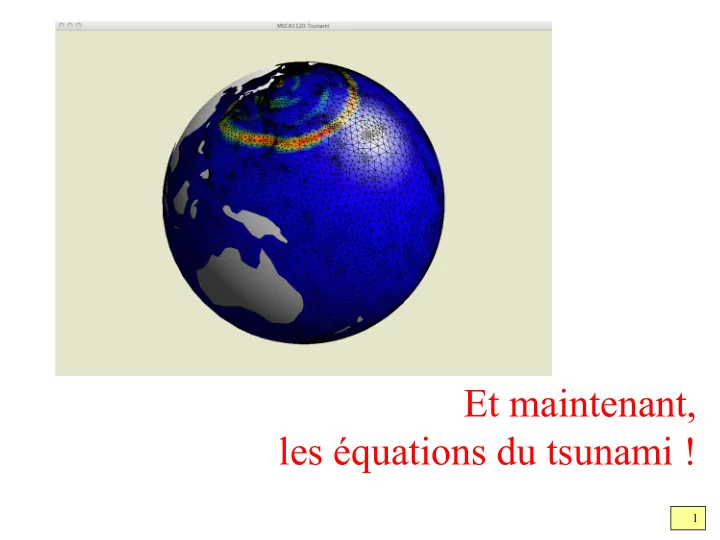

Et maintenant, les équations du tsunami ! 1 1
( y r ) COMPOSANTES D E VITESSE RVAMON Ï " ELEVATION MASSE D E | \ ← L A BILAN QUANTITE D E M N T :-O" The so-called PRESSION HYDROSTATIQUE EEE Shallow Water } Equations Very crude model for geophysical flows, but allows the existence of inertia-gravity waves PROFONDEUR D E L'OCEAN 2 2
An analytical problem as a numerical validation : Stommel :-) Forcing wind term [N m -2 ] Gravity [m s -2 ] Coriolis factor [s -1 ] Dissipation coefficient [s -1 ] 3
Un modèle unidimensionnel le long de l’interface… + 4 ¥ Ê o = Discontinuous Galerkin Comment calculer les flux de masse et de quantité de mouvement aux interfaces ? 4
Un solveur de Riemann… Discontinuous Galerkin Comment calculer les flux de masse et de quantité de mouvement aux interfaces ? 5
Calculons les valeurs propres de A pour découpler les deux équations… Deux vecteurs propres C 'EST FACILE OBTENIR A Deux valeurs propres 6
¥ :L. - 7 ¥ Ë ← - E . Y dur = | VEpÊ ↳ Éploré ¥. d e t # - I I ) - O ( ¥ - I I I . e - - o ouf} -Il x = . . ↳ d . ±Fg
Effectuons un changement de variables… Matrice des deux vecteurs propres r et s sont appelées les invariants de Riemann :-) 7
Et on obtient… + t g ¥, - - o E r … deux → équations de transport découplées ! ¥ - t ¥ " ← 8
Les invariants de Riemann sont r t | constants le long des courbes caractéristiques ! X - 9
Et on sait j'üÏ"" ce qu’il faut faire pour une équation de transport pur ! O - D Le solveur dit de Riemann :-) 10
Et en termes de vitesses et d’élévation _ Le solveur dit de Riemann :-) 11
A 1D sharp simplified problem in a finite domain - 12
What is t = 0 the solution ? t = 1 V a u t ¢ [ " E Rossby’s radius 13
A more and more t = 2 complex and interesting solution… t = 33 14
t = 500 What are the equations ? Helmholtz’s Equation Forced Wave Equation 15
How does information m n / • propagate ? INARI D E RIEMANN Riemann’s Invariants t = 1 e s t 1 - × 16
Two distinct t = 1 waves… 17
An analytical t = 700 solution exists ! Separation of the Classical Equations with the boundary conditions - o 18
Analytical solution for any initial elevation data 19
A family of initial conditions… R = 100 R = 10 Stiffness factor R = 1000 20
The Continuous Galerkin Method 21
The Continuous n = 200, t = 2 Galerkin Method n = 2000, t = 2 Oscillating solutions that only converge in a mean sense… 22
For smooth n = 200, t = 2, R = 10 solutions, it works ! n = 200, t = 2, R = 100 23
The Optimal Technique : Integrating along characteristics t = 200 Second-order Runge-Kutta Ent' o q × → # × O E n 24
Time integration t = 200 Explicit Euler has to be D t = 0.001 accurately performed… t = 200 t = 200 Heun (RK-2) Explicit Euler D t = 0.01 D t = 0.01 25
The Discontinuous Riemann-Galerkin Method t = 2 26
Increasing P 1 -P 1 the order ¥ RATELIER Maxence ! of shape ¢ functions… P 2 -P 2 ← . 27
The jumps at discontinuities are How to estimate proportional to the local error the local error ? O R D R E - The local error are also proportional to h p+1 where p is the order of elements and h the characteristic size. The Discontinuous Galerkin Method provides an efficient and simple error estimator ! 28
Adaptive strategy ERREUR cocace - recensé Target error [ESTIMA TION New requested mesh L'ERREUR D E size field from the error estimator From this new mesh size field, we can create a new adapted mesh. 29
How to evaluate The error estimator slightly the error overestimates the error, but converges to the true error estimator ? Effectivity index Norm of the error estimator Asymptotic behaviour Norm of the exact error 30
Recommend
More recommend